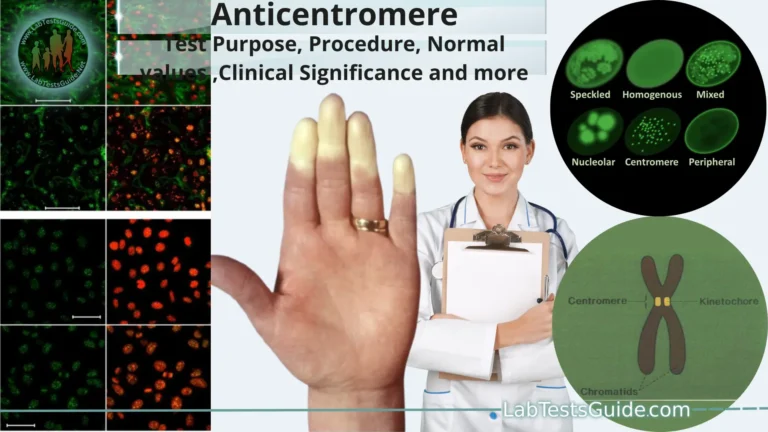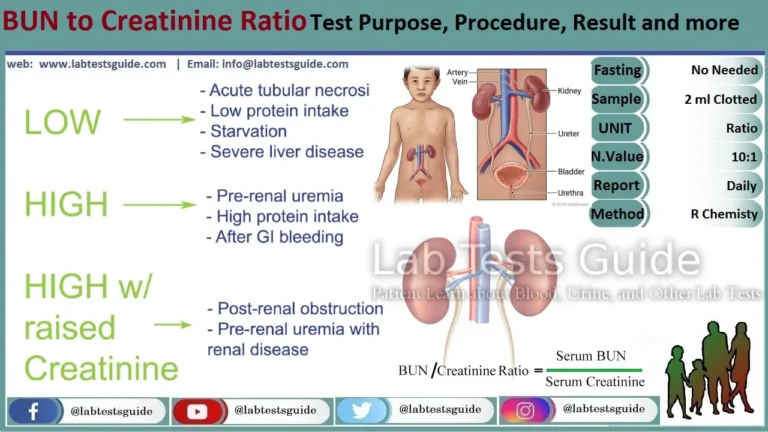Calcitonin Test Purpose, Procedure, Result and more
Calcitonin is a hormone that plays a role in regulating the levels of calcium in the blood. It is primarily produced by the thyroid gland, but can also be produced by other tissues in the body such as the lungs and thymus. Calcitonin helps to lower the levels of calcium in the blood by promoting the deposition of calcium in the bones and inhibiting the release of calcium from the bones. It also plays a role in regulating the metabolism of phosphate in the body. It is used to treat osteoporosis and hypercalcemia.
| Also Known as | Human Calcitonin, Calcitonin, Thyrocalcitonin |
| Test Purpose | The main purpose of calcitonin is to regulate the levels of calcium in the blood. |
| Test Preparations | Overnight fasting is preferred. |
| Test Components | Calcitonin (Serum) |
| Specimen | 2 mL (0.5 mL min.) Serum from 1 Red Top (No Additive) tube. |
| Stability Room | 2 hours |
| Stability Refrigerated | 6 hours |
| Stability Frozen | 2 Weeks |
| Method | CLIA, ELISA, RIA |
| Download Report | Calcitonin Report Formate |

What is Calcitonin ?
Calcitonin is a hormone that regulates the levels of calcium in the blood. It is produced by the thyroid gland and helps to lower the levels of calcium by promoting the deposition of calcium in the bones and inhibiting the release of calcium from the bones. Additionally, it regulates the metabolism of phosphate in the body and is used to treat conditions such as osteoporosis and hypercalcemia.
What is the function of calcitonin?
- Regulating the levels of calcium in the blood by promoting the deposition of calcium in the bones and inhibiting the release of calcium from the bones.
- Helping to maintain the balance between calcium and phosphate in the body by promoting the excretion of phosphate in the urine.
- Playing a role in the regulation of bone metabolism.
- Used clinically to treat conditions such as osteoporosis and hypercalcemia.
- Helping in preventing bone loss and promoting bone growth.
- Acting as an antagonist to parathormone, which regulates calcium levels in the body
- Involved in the regulation of blood pressure, nerve and muscle function, and blood clotting.
Why to get tested ?
Calcitonin is typically tested to evaluate and monitor certain medical conditions or to check for the presence of certain tumors. Some reasons why a healthcare provider may order a calcitonin test include:
- To diagnose and monitor medullary thyroid cancer: Medullary thyroid cancer is a type of thyroid cancer that produces calcitonin, so measuring the levels of calcitonin in the blood can help diagnose and monitor this type of cancer.
- To evaluate hypercalcemia: High levels of calcitonin can indicate hypercalcemia, which is a condition characterized by high levels of calcium in the blood.
- To check for the presence of other types of tumors: Certain types of tumors, such as lung or breast cancer, can produce calcitonin, so measuring the levels of calcitonin in the blood can help check for the presence of these types of tumors.
- To monitor treatment response: If a person has been diagnosed with medullary thyroid cancer or hypercalcemia, measuring the levels of calcitonin in the blood can help monitor the effectiveness of treatment.
- To evaluate the cause of osteoporosis: Calcitonin plays a role in the regulation of bone metabolism. Measuring the levels of calcitonin can help evaluate the cause of osteoporosis.
It is important to note that a single calcitonin test may not provide enough information to make a diagnosis, and that other tests may also be needed to help evaluate a person’s condition.
When to get Calcitonen tested ?
A healthcare provider may order a calcitonin test when they suspect that a person may have a medical condition that is associated with high or low levels of calcitonin. Some specific situations in which a calcitonin test may be ordered include:
- When a person has symptoms of medullary thyroid cancer, such as a lump in the thyroid gland, hoarseness, or difficulty swallowing.
- When a person has symptoms of hypercalcemia, such as weakness, fatigue, nausea, vomiting, constipation, and confusion.
- When a person has a family history of medullary thyroid cancer or multiple endocrine neoplasia type 2 (MEN2), which is an inherited disorder that increases the risk of developing medullary thyroid cancer.
- When a person has a suspicious lump or mass in the thyroid gland or other parts of the body that may be indicative of a tumor.
- When a person has a history of osteoporosis, or a family history of osteoporosis, a calcitonin test may be ordered to evaluate the cause of the condition.
- When a person has been diagnosed with medullary thyroid cancer or hypercalcemia, and a calcitonin test may be ordered to monitor the effectiveness of treatment.
It is important to note that not everyone with these symptoms or risk factors will require a calcitonin test, and that a healthcare provider will make the decision about whether or not to order the test based on an individual’s specific circumstances.
Test Preparation :
Calcitonin testing Overnight fasting is preferred. . However, there are a few things that a person should keep in mind before having the test:
- Schedule the test early in the day: It is best to schedule the test for the morning, as calcitonin levels in the blood can vary throughout the day.
- Avoid taking calcium supplements: If possible, avoid taking calcium supplements for 24 hours before the test, as they can affect the results of the test.
- Inform your healthcare provider of any medications you are taking: Be sure to tell your healthcare provider about any medications you are taking, as some medications, such as diuretics, can affect the results of the test.
- Avoid strenuous exercise: It is best to avoid strenuous exercise for 24 hours before the test, as exercise can affect the results of the test.
- Inform your healthcare provider if you are pregnant: It is important to inform your healthcare provider if you are pregnant, as the results of the test may be affected by pregnancy.
- Follow any additional instructions provided by your healthcare provider: Your healthcare provider may have additional instructions for you to follow before the test, such as fasting for a certain amount of time. Be sure to follow these instructions carefully.
It’s important to note that this list may not be exhaustive and that you should always follow the specific instructions provided by your healthcare provider.
Sample Required :
2 mL (0.5 mL min.) Serum from 1 Red Top (No Additive) tube.
Normal Values:
Calcitonin reference values, also known as normal range, vary depending on the laboratory that performs the test and the method used. The normal range for calcitonin levels in the blood is typically between 0 and 11 pg/mL (picograms per milliliter).
Source 2
- Basal (plasma)
- Male = ≤19 pg/mL (≤19 ng/L)
- Female = ≤14 pg/mL (≤14 ng/L)
- Calcium infusion (2.4 mg/kg)
- Male = ≤190 pg/mL (≤190 ng/L)
- Femal = ≤130 pg/mL (≤130 ng/L)
- Pentagastrin injection (0.5 µg/kg)
- Male = ≤110 pg/mL (≤110 ng/L)
- Female = ≤30 pg/mL (≤30 ng/L)
It’s important to note that some laboratories may have different reference ranges and that it is always best to consult the lab report or speak with your healthcare provider to understand the results of your specific test.
It’s also important to note that the normal range may vary depending on the person’s age, sex, and overall health. For example, calcitonin levels may be higher in women than in men, and they may be higher in older adults than in younger adults.
If your test results fall outside the normal range, it does not necessarily mean that you have a medical condition, and your healthcare provider will take several factors into account when interpreting your test results. They may also order additional tests, or perform a physical examination to help determine the cause of abnormal results.
Calcitonin Level Increases In:
Calcitonin levels can be elevated in several conditions, some of which include:
- Medullary thyroid cancer: This type of thyroid cancer produces calcitonin, so high levels of calcitonin in the blood can indicate the presence of medullary thyroid cancer.
- Hypercalcemia: High levels of calcitonin can indicate hypercalcemia, which is a condition characterized by high levels of calcium in the blood.
- Other types of tumors: Certain types of tumors, such as lung or breast cancer, can produce calcitonin, so high levels of calcitonin can indicate the presence of these types of tumors.
- Paget’s disease: is a chronic bone disorder characterized by abnormal bone remodeling, which can lead to bone pain, deformities, and an increased risk of fractures.
- Hyperparathyroidism: is a condition in which the parathyroid glands overproduce parathyroid hormone (PTH) leading to an increase in blood calcium levels.
- Thyrotoxicosis: is a condition in which the thyroid gland produces an excessive amount of thyroid hormones leading to high levels of calcitonin.
- Acute pancreatitis: is a serious inflammation of the pancreas which can lead to high levels of calcitonin.
It’s important to note that this list may not be exhaustive and that other medical conditions or factors can also cause an increase in calcitonin levels. Your healthcare provider will take into account your medical history and other factors when interpreting your test results.
Calcitonin Level Decreases In:
Calcitonin levels can be decreased in several conditions, some of which include:
- Hypocalcemia: Low levels of calcitonin can indicate hypocalcemia, which is a condition characterized by low levels of calcium in the blood.
- Hypoparathyroidism: is a condition in which the parathyroid glands do not produce enough parathyroid hormone (PTH) leading to low levels of blood calcium.
- Osteoporosis: is a condition characterized by low bone density and an increased risk of fractures. Low levels of calcitonin can indicate osteoporosis.
- Malnutrition: can affect the production of calcitonin and lead to decreased levels.
- Chronic kidney disease: is a long-term condition that can affect the production of calcitonin and lead to decreased levels
- Thyroid disorders: can affect the production of calcitonin and lead to decreased levels.
It’s important to note that this list may not be exhaustive and that other medical conditions or factors can also cause a decrease in calcitonin levels. Your healthcare provider will take into account your medical history and other factors when interpreting your test results.
FAQs
What is calcitonin?
Calcitonin is a hormone that regulates the levels of calcium in the blood. It is produced by the thyroid gland and helps to lower the levels of calcium by promoting the deposition of calcium in the bones and inhibiting the release of calcium from the bones. Additionally, it regulates the metabolism of phosphate in the body and is used to treat conditions such as osteoporosis and hypercalcemia.
What are the normal range of Calcitonin levels?
The normal range for calcitonin levels in the blood is typically between 0 and 11 pg/mL (picograms per milliliter). However, it is best to consult the lab report or speak with your healthcare provider to understand the results of your specific test.
What are the causes of high Calcitonin levels?
Calcitonin levels can be elevated in several conditions, such as medullary thyroid cancer, hypercalcemia, other types of tumors, Paget’s disease, Hyperparathyroidism, Thyrotoxicosis, Acute pancreatitis.
What are the causes of low Calcitonin levels?
Calcitonin levels can be decreased in several conditions, such as hypocalcemia, hypoparathyroidism, osteoporosis, malnutrition, chronic kidney disease, and thyroid disorders.
How is Calcitonin Test done?
The calcitonin test is typically done by taking a blood sample from a vein in the arm. The sample is then sent to a laboratory for analysis.
How to prepare for a Calcitonin Test?
Calcitonin testing typically does not require any special preparation, but it is best to schedule the test early in the day, avoid taking calcium supplements for 24 hours before the test, inform your healthcare provider of any medications you are taking, avoid strenuous exercise for 24 hours before the test, and follow any additional instructions provided by your healthcare provider.
Possible References Used






